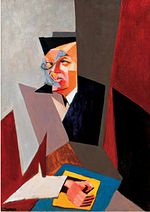
#art #journalism #product #understood #work
Read through all quotes from Tristan Tzara
Tzara often appealed to revolutionary and ironic images portraying provincial and middle class environments as places of artificiality and decay demystifying pastoral themes and evidencing a will to break free. In 1923 he and a few other former Dadaists collaborated with Richter and the Constructivist artist El Lissitzky on the magazine G and the following year he wrote pieces for the Yugoslav-Slovenian magazine Tank (edited by Ferdinand Delak). In 1977 literary historian Edgar Papu whose controversial theories were linked to "protochronism" which presumes that Romanians took precedence in various areas of world culture mentioned Tzara Urmuz Ionesco and Isou as representatives of "Romanian initiatives" and "road openers at a universal level.
Having spoken in favor of liberalization in the People's Republic of Hungary just before the Revolution of 1956 he distanced himself from the French Communist Party of which he was by then a member. After moving to Paris in 1919 Tzara by then one of the "presidents of Dada" joined the staff of Littérature magazine which marked the first step in the movement's evolution toward Surrealism. During World War I after briefly collaborating on Vinea's Chemarea he joined Janco in Switzerland.
